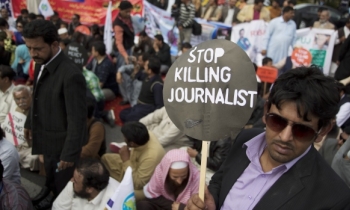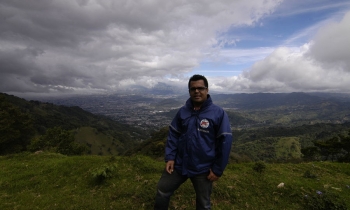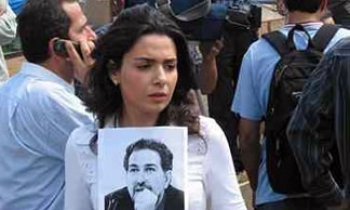A New York Times correspondent and a British freelancer who were arrested and accused of reporting illegally in Zimbabwe have been freed on bail, but their passports are being held and they are unable to leave the country, the Associated Press (AP) has reported quoting a lawyer.
Barry Bearak, a Pulitzer Prize-winning journalist for the Times, suffered a back injury during a fall in his cell, said Harrison Nkomo, a lawyer representing the two. The Times reported on its website Monday that Bearak had fallen 7 feet from his bunk on to a concrete floor in his cell. The Briton is Stephen Bevan, a freelance journalist with London's Sunday Telegraph.
"They have both been released on 300 million (Zimbabwean) dollars bail," lawyer Harrison Nkomo told journalists outside the court, according to Agence France-Presse (AFP). The bail amount is equivalent to 10,000 US dollars according to the official exchange rate.
A judge had ordered the foreigners' release last week but they continued to be held for days. The journalists were detained Thursday by heavily armed riot police who surrounded and entered a Harare hotel frequented by foreign reporters. Police spokesman Wayne Bvudzijena said he was not aware that either of the journalists had fallen in the cells or been injured, acording to a Reuters report.
“We are relieved that our colleague is out on bail,” said Committee to Protect Journalists (CPJ) Executive Director Joel Simon said. “The charges against Barry Bearak have been murky at best. These spurious charges should be dropped and Bearak should be freed immediately.”
Zimbabwe’s restrictive journalist accreditation law, the Access to Information and Protection of Privacy Act, has been used to block international and some local reporters from covering the elections, according to CPJ. Only a handful of foreign journalists received accreditation despite 300 accreditation requests, according to the pro-government daily the Sunday Mail.
President Robert Mugabe’s government passed the draconian accreditation law on the eve of the last presidential election in March 2002 to suppress international coverage. Mugabe then signed an amended version of the law in January, which decriminalized practicing journalism without accreditation. The Foreign Correspondents Association of Southern Africa, which represents 192 journalists from 122 media around the world, had protested what it called a "near-blanket denial of accreditation."
Bill Keller, executive editor of the New York Times, said Saturday that Bearak had been interrogated for hours by police trying to get him to give names of people he had interviewed. Nkomo said the journalists are expected to appear in court Thursday, at which point he plans to argue they should not be tried at all because they did not commit a crime.
The offence, if convicted, carries a maximum penalty of a fine, two years in prison, or both, another lawyer said earlier.
The South Africans, technicians for satellite TV servicing company Globecast, were slapped with two sets of charges. They will appear in court on Tuesday over the first charge of breaching accreditation rules and again on Friday on a second charge related to their initial release last week, Globecast CEO Alan Hird told AFP.
After Monday's hearing one of the South Africans, who suffers from diabetes, was expected to return to a Harare hospital where his blood sugar level was being monitored. The pair were ordered to pay bail of 200 million Zimbabwean dollars each before they would be freed pending their next court appearance.
Zimbabwe's electoral commission has yet to announce the results of the March 29 presidential election. Unofficial tallies by independent monitors show opposition leader Morgan Tsvangirai won more votes than longtime President Robert Mugabe—but fewer than the 50 per cent plus one vote required to avoid a runoff. Tsvangirai claims to have won the election outright. Mugabe's party has demanded a vote recount and a further delay in the release of the results.









